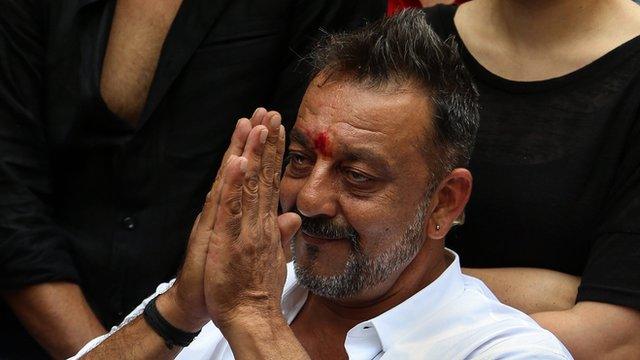Sanju: Is this Bollywood blockbuster whitewashing Sanjay Dutt?
- Published
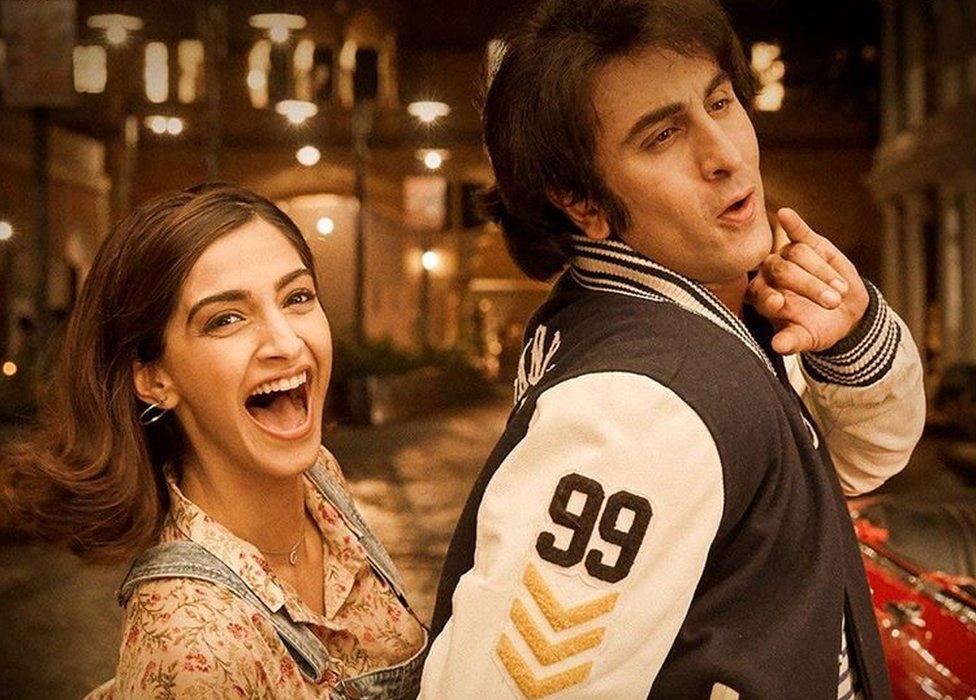
Ranbir Kapoor plays Sanjay Dutt in the blockbuster hit
Bollywood actor Sanjay Dutt is one of India's most controversial celebrities. His addiction to alcohol and drugs, his alleged affairs and, most damningly, his conviction in a terror case have all been avidly documented. But a newly released biopic has been accused of "whitewashing" his chequered past, writes Aparna Alluri.
One week into its release, the film Sanju has been billed as one of the most successful Bollywood movies ever. But film reviewers have called it "dishonest" and "misleading", while some of those who watched it describing it as a "hagiography" and a "public relations campaign" on Twitter.
Ranbir Kapoor, who plays Dutt, has got rave reviews for a raw, immersive performance and the movie has been praised for its touching portrayal of Dutt's relationship with his unflinchingly loyal father. Otherwise, Sanju is "anything but honest" in the words of one reviewer, external. Another says the movie is "a largely sanitised version of the star's life" and merely "an expensive, endearing gift from a filmmaker to his friend". A third said it was a lost opportunity to delve deeper into Dutt's personality because "when the film rolls to a full stop, the real Sanju is still a… question mark".
Allow X content?
This article contains content provided by X. We ask for your permission before anything is loaded, as they may be using cookies and other technologies. You may want to read X’s cookie policy, external and privacy policy, external before accepting. To view this content choose ‘accept and continue’.
Sanju is short for Sanjay and as the endearing nickname-turned-title suggests, it's an indulgent tale. It's told with affection and sympathy for the now 58-year-old Dutt, who emerges as a victim of faulty choices. The oldest of three children, Sanjay Dutt was born to Nargis and Sunil Dutt, two of Indian cinema's most celebrated and beloved actors. Since his debut in 1981, he has starred in more than 100 films, from romances to action-packed gangland films to slapstick comedies.
The movie is upfront about the fact that this is Dutt's perspective - it unfolds through his search for a biographer who will do justice to his story, which he believes has been misrepresented by the "media", the movie's ultimate villain.
The film begins before the release of Dutt's debut film, when the awkward 22-year-old is shown struggling under the weight of his father's expectations while coping with the news that his mother has been diagnosed with pancreatic cancer. By the time his mother died, Dutt was an addict, external - "there are no drugs in the world that I have not done" he said in a public speech in 2017.
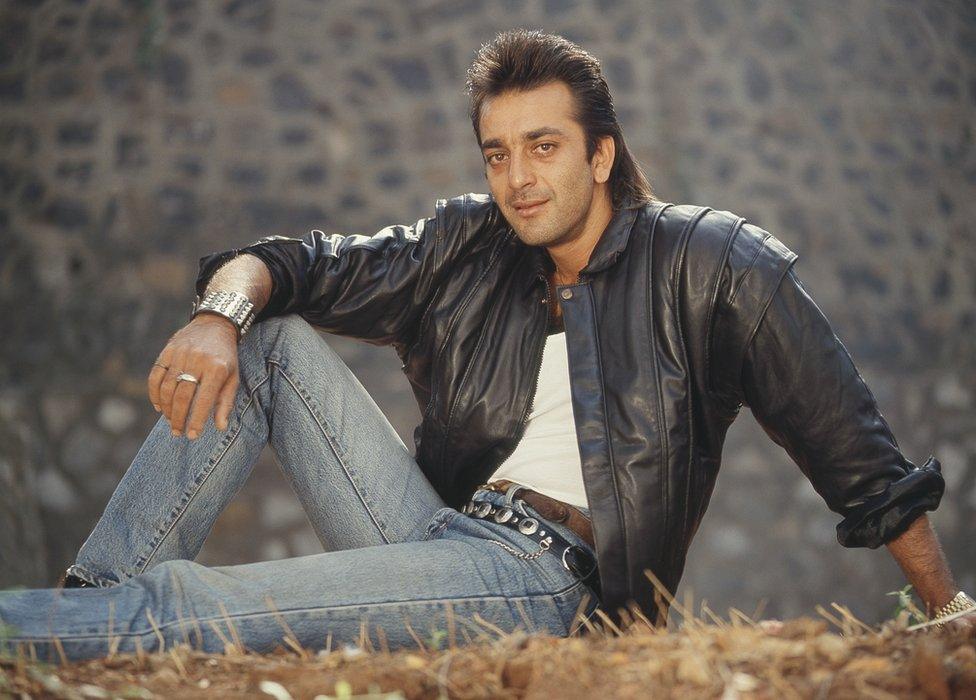
Sanjay Dutt has starred in more 100 films since his debut in 1981
The movie is unapologetic in its first hour. It shows an intoxicated, hallucinating Dutt stumble through life as he disappoints his father and breaks his girlfriend's heart. He was taking heroin in his mother's hospital room when she woke up from her coma, before passing away moments later.
The rest of the film follows the criminal case against Dutt, who was sentenced in 2006 for firearms offences linked to the 1993 Mumbai blasts which killed 257 people and injured 713. Dutt was charged with possessing three AK-56 rifles (assault rifles) and their ammunition, one 9mm pistol and its cartridges, and hand grenades.
He bought the firearms from the bombers but he said the weapons were necessary to defend his family during the Hindu-Muslim rioting of 1993. The arms were allegedly part of the main consignment used in the blasts but Dutt was cleared of all conspiracy charges. He was released from prison in 2016 after spending about three years behind bars. His early release sparked outrage, with critics saying he had already been granted an unreasonable amount of parole and leave because of his celebrity status.
While the movie traces these broad facts, it seems to gloss over Dutt's (and Bollywood's) alleged links to the underworld, such as when an audiotape surfaced in the media in 2001 where he was allegedly in conversation with underworld figure Chotta Shakeel, who is based in Pakistan. Bollywood stars and film producers have long been accused of having close links with the underworld, external and some have allegedly used these connection to get roles.
But the movie doesn't dwell on any of this. According to one reviewer, the 1993 Mumbai bomb blasts and the allegations against Dutt are dealt with a little too quickly, external ("Any self-aware film would have at least wondered on the relationship between AK-56 and self-defence".) The critics also took issue with the ease with which the media was painted as a "villain", external. While admitting that the news cycle can be unforgiving, and is often unforgivable, one reviewer wrote: "This point is harped on endlessly, as though to suggest Sanju would not have suffered if the newspapers had been more responsible."
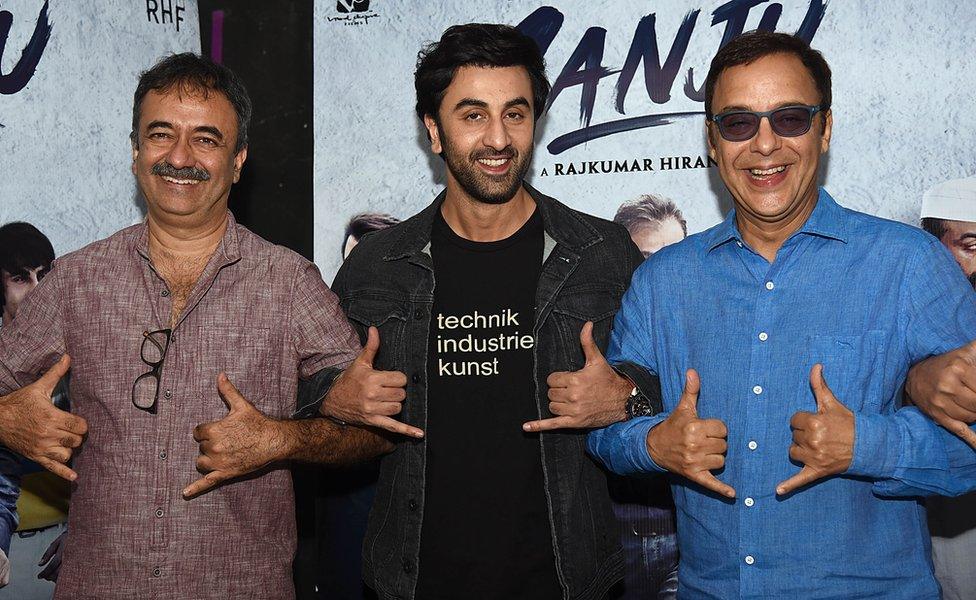
The film is the highest grossing Bollywood film of 2018
For a biopic, the movie also leaves out a lot - two of his three marriages, one of his children, his reportedly strained relationship with his sisters, and his alleged love affairs with co-stars find no mention.
"When you try to condense a life of person in to two-and-a-half hours, you have to choose what is relevant," director Rajkumar Hirani told the BBC Asia Network's Haroon Rashid.
He also said his version of the film was based on months of research and interviews. "I met the police officer who arrested him. Then I met all the lawyers who had fought for him. I met many journalists. I would have met like 40 to 50 people, heard the story from all of them - then put out this story."
Most people have welcomed the movie, comfortable with the notion that this is a one-sided story. But it has raised an inevitable question: can Bollywood make an authentic and unbiased biopic about one of its own?
- Published25 January 2018
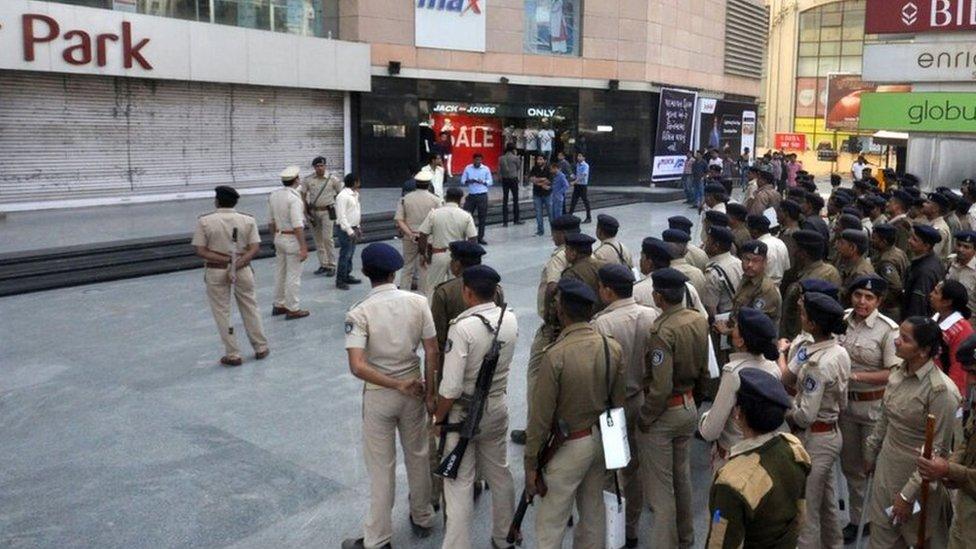
- Published27 July 2017
- Published25 February 2016
